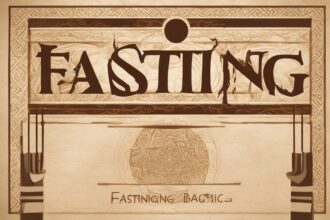Fasting, a practice as ancient as human civilization itself, has roots that stretch across cultures, religions, and eras. At its core, fasting involves voluntary abstinence from food and sometimes drink for a specific period, often tied to spiritual, health, or social purposes. The concept of dietary abstinence, in particular, has evolved over millennia, shaping societal norms and personal disciplines. This article delves into the origins of dietary abstinence, exploring its historical, cultural, and spiritual significance through various lenses. By understanding where this practice began, we can better appreciate its relevance in modern times.
The Ancient Roots of Dietary Abstinence
The origins of dietary abstinence can be traced back to prehistoric times when early humans faced periods of food scarcity due to environmental challenges or migration. While not always voluntary, these periods of enforced fasting likely influenced early cultural attitudes toward food restriction. Anthropologists suggest that early humans may have attributed spiritual or supernatural significance to hunger, viewing it as a means of connecting with higher powers or cleansing the body. This primal link between abstinence and spirituality laid the groundwork for more structured fasting practices in later civilizations.
In ancient Mesopotamia, one of the cradles of civilization, fasting was often tied to mourning or appeasing deities. Similarly, in ancient Egypt, priests and pharaohs would abstain from food before significant rituals to achieve purity. These early examples highlight how dietary abstinence was not merely a survival mechanism but a deliberate act with profound symbolic meaning.
Religious Foundations of Fasting Practices
Religion has played a pivotal role in formalizing dietary abstinence across the globe. Many of the world’s major faiths incorporate fasting as a core tenet, often linking it to purification, penance, or devotion. In Hinduism, one of the oldest religions, fasting dates back thousands of years and is associated with festivals like Navratri, where devotees abstain from certain foods to honor deities. Similarly, in Buddhism, monks often practice dietary restrictions as part of their ascetic lifestyle, reflecting the origins of dietary abstinence in self-discipline and detachment from worldly desires.
In the Abrahamic traditions, fasting holds significant importance as well. For instance, the Jewish practice of Yom Kippur, the Day of Atonement, involves a 25-hour fast to seek forgiveness and spiritual renewal. In Islam, the holy month of Ramadan mandates fasting from dawn to dusk, emphasizing self-control and empathy for the less fortunate. Christianity also has a long history of fasting, particularly during Lent, a 40-day period of reflection leading up to Easter. These religious practices underscore how deeply embedded dietary abstinence is in spiritual life, a tradition that continues to influence millions today.
Cultural Significance of Dietary Abstinence
Beyond religion, cultural practices have shaped the origins of dietary abstinence in unique ways. In many indigenous communities, fasting was often a rite of passage or a preparation for vision quests. For example, among Native American tribes, young individuals would fast for days in solitude to receive spiritual guidance or mark their transition into adulthood. This demonstrates how dietary abstinence was not just about deprivation but about transformation and connection with nature or the divine.
In ancient Greece, fasting was linked to philosophical ideals of self-mastery. Thinkers like Socrates and Plato advocated for moderation in diet as a means of achieving mental clarity and moral virtue. The Greek tradition of fasting before participating in the Eleusinian Mysteries, sacred rituals tied to the goddess Demeter, further illustrates how cultural contexts gave rise to structured abstinence practices. To explore more about fasting in ancient cultures, check out our post on Fasting in Ancient Greece.
Health and Therapeutic Origins of Fasting
While spiritual and cultural drivers dominated early fasting practices, the therapeutic benefits of dietary abstinence were recognized in antiquity as well. Ancient Greek physicians like Hippocrates, often called the “Father of Medicine,” believed that fasting could help the body heal itself by allowing it to rest from digestion. He famously stated, “To eat when you are sick is to feed your sickness,” highlighting an early understanding of fasting’s potential to restore balance in the body.
In traditional Chinese medicine, fasting was sometimes prescribed to cleanse the body of toxins and harmonize internal energies. Similarly, in Ayurveda, an ancient Indian healing system, periodic fasting is recommended to balance the doshas (body energies) and promote overall well-being. These early medical perspectives on dietary abstinence reveal a holistic approach to health that integrates mind, body, and spirit. For more on fasting’s health benefits, read our detailed guide on Fasting and Wellness.
Political and Social Dimensions of Abstinence
Dietary abstinence has also served as a tool for social and political expression throughout history. In ancient Rome, fasting was sometimes used as a form of protest or to demonstrate moral superiority. During the 20th century, figures like Mahatma Gandhi employed fasting as a nonviolent means of resistance during India’s struggle for independence. Gandhi’s hunger strikes were not only a personal act of discipline but also a powerful statement against colonial oppression, showing how the origins of dietary abstinence can extend into realms of activism and societal change.
Similarly, in various societies, fasting has been a way to express solidarity or empathy. Communal fasting during times of famine or disaster often fostered a sense of shared sacrifice and resilience. These examples illustrate how dietary abstinence transcends individual choice, becoming a collective act with profound social implications. Learn more about fasting as a form of protest in our article on Fasting for Social Change.
Evolution of Dietary Abstinence in Modern Times
Fast forward to the present day, and the origins of dietary abstinence continue to influence contemporary practices, albeit in new forms. While religious and cultural fasting remains prevalent, modern interpretations often focus on health and lifestyle benefits. Intermittent fasting, for instance, has gained immense popularity as a weight management and wellness strategy, rooted in the same principles of restriction and renewal that ancient societies embraced.
Additionally, fasting has found a place in environmental and ethical movements. Many individuals now abstain from certain foods or adopt plant-based diets as a form of fasting to reduce their carbon footprint or protest industrial farming practices. This evolution reflects how the concept of dietary abstinence adapts to the needs and values of each era. For a deeper dive into modern fasting trends, explore our piece on Intermittent Fasting Today, or check out our guide to Ethical Fasting Practices.
Disclaimer: The information provided in this article is for educational and informational purposes only and should not be considered medical advice. Fasting can have varying effects on individuals depending on health conditions, age, and other factors. Always consult with a healthcare professional or nutritionist before beginning any fasting regimen or making significant dietary changes. The authors and publishers are not responsible for any adverse effects resulting from the application of the information contained herein.
References
- Encyclopaedia Britannica – Fasting: Historical and Cultural Overview
- National Center for Biotechnology Information – Therapeutic Fasting in Ancient Medicine
- History.com – The History of Fasting Across Religions
- JSTOR – Fasting as a Social and Political Tool
- World Health Organization – Fasting and Health: Cultural Perspectives
This content is for informational purposes only and not a substitute for professional advice.






